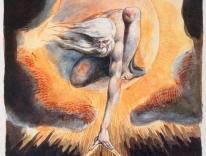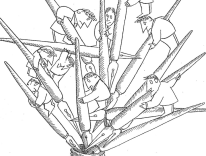The AMC television series Breaking Bad has gotten lots of attention lately. (See, for instance, the long profile of the show's creator, Vince Gilligan, in the New York Times Magazine.) I only recently started watching the show, powering through the first two seasons in about a week and a half. Breaking Bad is a strange hybrid. On the one hand, it's a pacing-around-the-room, can't-sit-down thriller, creating suspense through all the usual means (plot twists, cliff hangers, creepy music). In this way, it's a rather traditional show, and I wasn't surprised to hear that Stephen King, whose novels brilliantly utilize the same tricks of the trade, was a fan.At the same time, though, Breaking Bad is an absolute original, aesthetically daring and formally inventive. Despite its terrific plotting, it can be a challenging show to watch, asking patience of its viewers as it introduces inexplicable, disturbing images that it will then take an entire season to explain. The show has both beautiful cinematographyin particular, the striking landscape shots of Albuquerque, New Mexico reminded me of David Foster Wallace's descriptions of the Arizona desert in Infinite Jestand some of the most creatively gruesome images you will ever see, the kind that will make you marvel at the show's genius and then later cause you nightmares. (At one point, for instance, a character tries to dissolve a body in acid in his porcelain tub, and things go terribly wrong.) Vince Gilligan has pulled off a difficult feat, creating a show that seems to be both pure entertainment and pure art. [I've tried not to give too much away, but be aware, some mild spoilers follow.]Breaking Bad takes what on the surface sounds like a ridiculous premise: an overqualified high school chemistry teacher named Walter White (played by Bryan Cranston) discovers that he has terminal lung cancer; with a pregnant wife and a disabled son, he then decides to cook crystal meth so as to set his family up financially before he passes away. Walt tries to keep his cooking life and his family life completely separate, but of course this can't last for long (especially after Walt's medical condition improves and he appears to have bought himself more time). We follow Walt as he descends further and further into moral darkness. By the end of the first season, the boring high school teacher has transformed himself into Heisenberg, the ruthless, mysterious producer of the most desirable drug on the market.Lots of people have made the comparison between Walter and Tony Soprano. In both Breaking Bad and the Sopranos, we are given a charismatic, complex anti-hero, someone who is willing to lie, cheat, and brutally murder others, yet someone who we still feel ourselves rooting for, maybe because of the occasional twinges of moral consciousness they display, maybe because both shows so brilliantly show us the dangerous allure of evil. But, for me, Walter is an even more fascinating character than Tony, and for two primary reasons. First, whereas the Sopranos opens with Tony as a successful, ruthless mafioso, long ago having made his decision to profit off of corruption and the pain of others, we actually see Walter break bad. Over the course of the first two seasons, as Walter finds himself drawn deeper and deeper into the drug tradefirst simply cooking, then hiring more dealers, then trying to expand his territory, finally condoning, and even coldly demanding, violence against those who threaten his empirewe can see the slow steps by which Walter becomes an amoral monster. Cranston portrays this transition delicately and absolutely convincingly.There is also a stark difference between how Tony and Walter relate to their own evil impulses. Tony could be self-pitying, he could bemoan his family's legacy of crime and the financial demands made upon a middle-aged man who must provide for his family, but at heart he accepted that he was a bad guy. Especially in the show's final season, when Tony murdered his beloved nephew Christopher and then slept with his girlfriend, even Tony could not deny the blackness of his soul. This was what made the final season so chilling: it seemed that Tony had finally embraced his role as villain.Walt, on the other hand, is a brilliant self-justifier. At one point, he declares to his seedy, money-laundering lawyer, I can't be the bad guy. When he explains away his actions, both to himself and to others, we want to believe him. With Tony, we knew from the start that every justification was self-serving; with Walt, it's a more complex matter. He says that he is cooking solely for his family, but we can't help but see that he loves everything associated with his new, illicit life: the danger and the excitement, for sure, but most of all the feeling of empowerment that it gives him. Walter's past is hinted at but never directly explainedwe know that he walked out on a biochemical company that, using his ideas, ended up making millionsbut we do know that he has always felt that his life has been chosen for him, that he lacked some fundamental sense of agency. This seems to have changed with his entrance into the drug trade. He is now more self-confident, more virile, more powerful, just plain happier. Cooking meth, it appears at least for awhile, is the best thing that ever happened to him.Walter bears comparison to the Satan of Milton's Paradise Lost. Like Satan, Walter cloaks his motives in language that would be convincing if it weren't so obviously self-serving. (Walt in particular appeals to a certain warped ideal of American masculinityhe delights in do-it-yourself projects, rejects charity as a bad word, and never even thinks of having his wife go back to work when the family is running up credit card bills and struggling to pay the mortgage. This uncompromising stance, of course, means that it is fine for him to do whatever it takes to provide for his family, no matter the consequences to others.) Like Satan, he puts his self before all others, even and especially when he claims to be doing something selfless. And like Satan, Walter shows us how attractive and ultimately deforming evil, and in particular its illusion of complete self-sufficiency, can be.Despite what this post may lead you to believe, Breaking Bad is not just about Walt. In particular, Jesse, Walt's former student and current partner in the production and distribution of meth, is an incredibly rich charactersad, funny, pathetic, and endearing. There's also Walter Jr., Walt's son with cerebral palsy who decides to go by the name Flynn in a bid to gain some measure of independence. For comic relief, there's Hank, Walt's blowhard brother-in-law who alsoyou guessed itworks for the DEA. All of these characters are affected by Walt's decisions. And one of the show's most pressing concerns is to show that we can't say to ourselves, I will do evil just this once, for just this amount of time, and then be done with it. The ripple effects of breaking badfor ourselves, for those we love, and even for complete strangersare endless.


